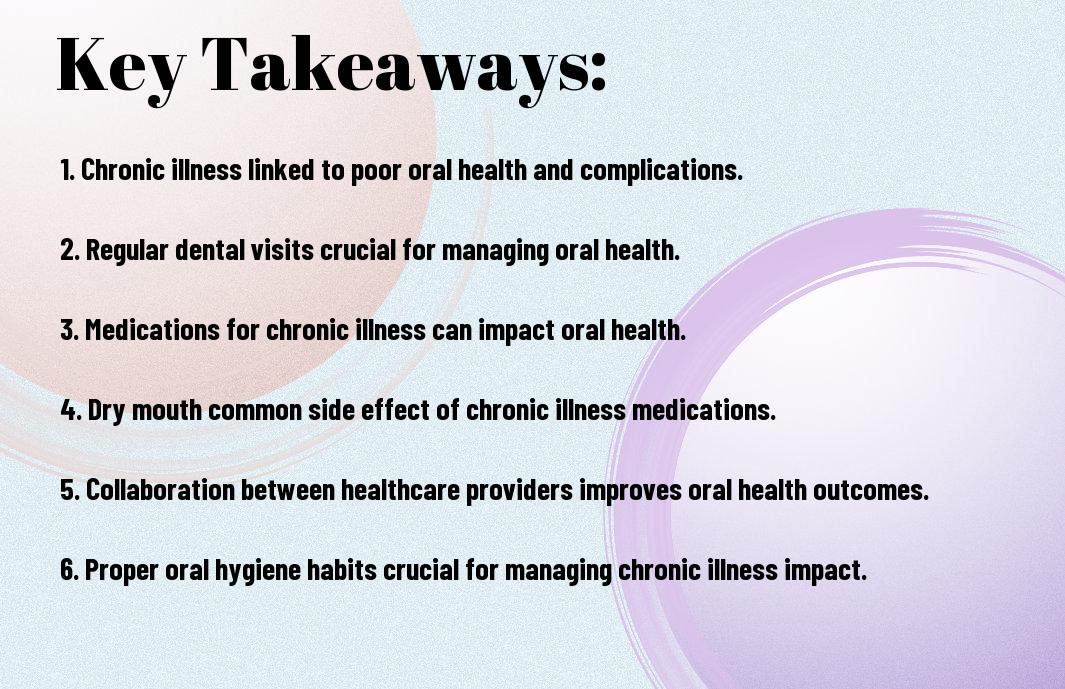Over 120 million Americans are living with a chronic illness, such as diabetes, heart disease, or arthritis, which can have a significant impact on their oral health. The link between chronic diseases and oral health is well-documented, as these conditions can exacerbate dental issues like gum disease and tooth decay. In this blog post, we will explore the effects of chronic illness on oral health and provide strategies for managing and preventing these issues. By understanding the connection between systemic health and oral health, individuals can take proactive steps to maintain a healthy smile despite the challenges posed by underlying medical conditions.

Key Takeaways:
- Chronic illnesses can significantly impact oral health: Patients with chronic conditions like diabetes, autoimmune diseases, or cancer often experience issues such as dry mouth, gum disease, and tooth decay due to medications or compromised immune systems.
- Comprehensive oral health management is crucial: Collaborative efforts between healthcare providers and oral health professionals are imperative to create individualized treatment plans that consider the patient’s chronic illness and its effects on oral health.
- Preventive care and regular monitoring are key: Emphasizing preventive measures such as proper oral hygiene, regular dental check-ups, and early intervention can help mitigate the impact of chronic illness on oral health and improve overall quality of life.
Common Oral Health Issues Associated with Chronic Illnesses
Oral Manifestations of Systemic Diseases
One of the common oral health issues associated with chronic illnesses is the manifestation of systemic diseases in the mouth. Conditions like diabetes, autoimmune disorders, and HIV/AIDS can often present with oral symptoms such as dry mouth, ulcers, gum inflammation, and fungal infections. These oral manifestations can serve as early warning signs of underlying systemic health issues and should not be ignored.
Direct and Indirect Implications
An important aspect of managing chronic illnesses is understanding the direct and indirect implications they have on oral health. Directly, these conditions can weaken the immune system, leading to an increased risk of gum disease, infections, and delayed wound healing in the oral cavity. Indirectly, medications used to treat chronic illnesses can cause side effects like dry mouth, which can further impact oral health.
As healthcare providers, it is crucial to recognize and address the oral health issues associated with chronic illnesses to provide comprehensive care for patients. By understanding the connections between systemic health and oral health, healthcare professionals can develop strategies to prevent potential complications and improve the overall well-being of individuals managing chronic illnesses.
Managing Oral Health in the Context of Chronic Illness
Preventive Care Strategies
Now, when it comes to managing oral health in the context of chronic illness, prevention is key. The importance of regular dental check-ups and cleanings cannot be overstated. Individuals with chronic conditions are often more susceptible to oral health issues, making preventive care even more crucial. Simple measures like brushing and flossing regularly, maintaining a balanced diet, and avoiding tobacco products can go a long way in preventing oral complications.
Therapeutic Interventions
The therapeutic interventions in managing oral health for individuals with chronic illnesses involve a multi-faceted approach. Dentists may recommend specialized treatments such as fluoride varnishes, antimicrobial mouth rinses, or custom mouthguards to address specific concerns. These interventions are tailored to the individual’s needs and help prevent further complications that may arise due to the chronic illness.
Context: It is necessary to note that individuals with chronic illnesses often face compromised immune systems and medication side effects that can impact their oral health. Therefore, a proactive approach that includes collaboration between healthcare providers, personalized treatment plans, and patient education is crucial for effectively managing oral health in the context of chronic illness.
Interdisciplinary Approaches to Oral Care
Role of Dental Professionals
Any chronic illness can have a significant impact on an individual’s oral health. Patients with conditions like diabetes, autoimmune disorders, and cardiovascular diseases are at a higher risk of developing oral health issues such as gum disease, tooth decay, and oral infections. Dental professionals play a crucial role in managing and preventing these oral health complications through regular assessments, tailored treatment plans, and patient education.
Collaboration with Medical Healthcare Providers
Role Chronic illness requires a multidisciplinary approach to care to ensure holistic support for patients. Collaboration between dental professionals and medical healthcare providers is crucial in addressing the complex relationship between systemic health and oral health. Medical providers can help dental professionals understand the patient’s overall health status, medications, and treatment regimens that may impact dental care decisions.
Healthcare providers must work together to create comprehensive treatment plans that consider the interplay between chronic illnesses and oral health. Close monitoring and coordination between medical and dental teams can lead to better outcomes for patients with chronic conditions.
Patient Education and Self-Care
Enhancing Awareness and Self-Management
Not all chronic illness patients are aware of the potential impact of their condition on oral health. It is crucial to educate individuals about the connection between systemic health and oral health. Encouraging self-management strategies such as regular dental check-ups, proper oral hygiene practices, and a healthy diet can significantly improve oral health outcomes.
Support Resources and Tools
For chronic illness patients struggling with oral health issues, there are various support resources and tools available to assist them in managing their oral health effectively. These include online educational materials, support groups, and healthcare professionals trained in addressing the unique needs of patients with chronic conditions.
Resources like informational brochures, online forums, and mobile applications can provide valuable tips and guidance on maintaining oral health while managing a chronic illness. Additionally, connecting with patient advocacy organizations and seeking guidance from healthcare providers can offer further support and resources for individuals facing oral health challenges.
Self-management strategies, awareness of potential oral health impacts, and access to support resources are important for chronic illness patients to effectively manage their oral health and overall well-being.
Summing up
Conclusively, the impact of chronic illness on oral health is significant and requires careful attention and management. Patients with chronic illnesses such as diabetes, cardiovascular diseases, and autoimmune disorders are at a higher risk of oral health issues. Understanding these connections and implementing appropriate management strategies, including regular dental check-ups, proper oral hygiene practices, and collaboration between medical and dental professionals, is crucial for ensuring optimal oral health and overall well-being in these individuals. By addressing oral health as an integral part of holistic healthcare, we can better support patients with chronic illnesses and improve their quality of life.
FAQ
Q: What is the impact of chronic illness on oral health?
A: Chronic illnesses such as diabetes, heart disease, and autoimmune disorders can have a significant impact on oral health. These conditions can weaken the immune system, increase inflammation, and reduce the body’s ability to fight off infections in the mouth, leading to various oral health issues.
Q: How can chronic illness affect dental treatment?
A: Chronic illnesses can affect dental treatment in several ways. Patients with chronic conditions may be more susceptible to infections, slower healing times, and increased risk of complications during dental procedures. It is crucial for dental professionals to be aware of a patient’s medical history and work closely with their healthcare providers to ensure safe and effective treatment.
Q: What are some management strategies for maintaining oral health with a chronic illness?
A: Some management strategies for maintaining oral health with a chronic illness include regular dental visits for cleanings and check-ups, practicing good oral hygiene habits such as brushing and flossing daily, avoiding tobacco and excessive sugar consumption, and discussing any concerns or changes in oral health with both your dentist and healthcare provider. It is important to take a proactive approach to oral health to prevent complications associated with chronic illness.






